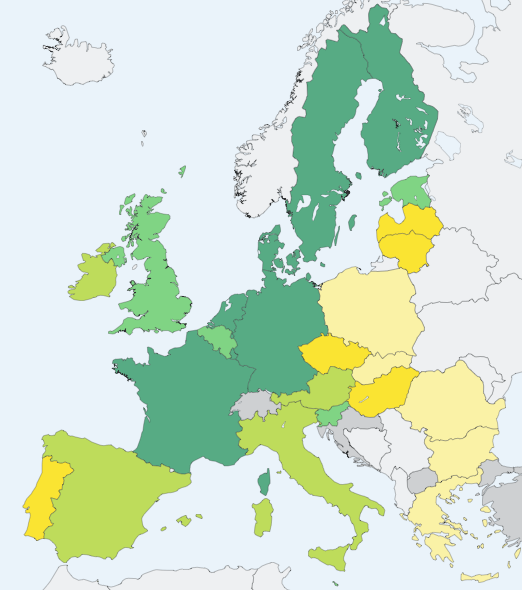A few months ago, I mentioned how academia.edu provides near-real-time tracking of visits and visitor demographics for any publications and used my own paper “Are We All Online Content Creators Now? Web 2.0 and Digital Divides” as an example to show how it works. Recently I came across a new tool that makes this tracking process much easier – Altmetric is an academic-focused social media tracking company. It makes its money selling large-scale data to publishers and academic institutions but if you are an academic and you have published anything with a DOI (or you want to find out something about the social media footprint of a competitor’s work for that matter) then Altmetric can display a “dashboard” of data like this. I’m quite pleased about this particular metric:
Archive for the 'Useful web resources' Category | back to home
If you are using images online as a journalist you need to ensure that you have the rights to put them on your site legally. If you do a Google image search, click on “search tools” and select “usage rights” that’s one way to ensure what you’re finding you can use, but in addition image libraries like Getty Images contain a lot of very high quality images (> 35m at last count) including pictures relating to the latest news. This is why they can charge for them and put watermarks over the images you can see for free so you don’t pirate them. Now, however, tired of trying to fight the many online pirates of their content, Getty seems to have decided to make it easy for people to use their images online for free in controlled ways with attribution.
They are defining “non-commercial” (and therefore permissible) uses of their images quite broadly so as long as you use their image embedding tool you should be able to legitimately use their many pictures on most journalistic projects online (for print use you would still need to purchase them). There is already speculation that the other major picture agencies may do likewise. Here’s how to take advantage of Getty Images’ new embed feature (and its limitations).
Getty’s “front page” for searching embeddable images is here.
I love hearing about the latest digital tools that help one operate as a journalist/researcher whether that be twitter search and monitoring tools, bookmark management tools, people search tools etc. “Search : theory and practice in journalism online” by Dick is particularly good for finding and describing this stuff – but I am not aware of any articles that bring the different pieces together to describe all the key online tools a journalist uses and how they all go together into a work flow. I plan to come up with something myself to share with students and if I do I will post it here but I would love to hear what other people are using.
Interesting – I just stumbled across a blog post about the demographics of contributors to Global Voices – the source I know best of news and information in blog form from a non-Western perspective. The post reveals among other things that “the Global Voices community is highly educated. Over 85% of respondents indicated they have completed a university degree, and more than 40% have a post-graduate or doctoral degree.” This does suggest alas that while groups like Global Voices have a valuable role to play in making voices heard that might not otherwise have a platform, blogging to and for a wider public still remains an elite activity.
I thought I would check out the top 100 most popular free audiobooks downloaded via Books Should Be Free and alongside the Swiss Family Robinson and other likely suspects I noted this:
I wouldn’t have expected the EU to have anything as sexy as a map-based visualisation tool but Eurostat‘s is not bad at all and lets me generate all kinds of infographics (like the one below) for teaching use.

Percentages of households with broadband in Europe 2009
You wouldn’t think it would be too hard to get TV listings that would cover all the freesat channels and provide reviews and ratings, particularly for all the films (I am uneasily aware that lots of films that are not reviewed in the papers and are on obscure satellite channels pass me by unseen). Alas the Radio Times is the leading free contender and a) it doesn’t include a few channels and b) its movies at a glance feature is seriously broken. It used to work really well about two years ago, letting me see a list of only those movies which had 4 or more stars but that feature was lost in a redesign and never renewed. I’ve looked at several other free online options (Onthebox, Yahoo TV guide, TV Guide and TV Easy) but they were even worse. Time Out which I used to buy mainly for the TV listings appears to be cutting down on their listings and in any case doesn’t offer them online.
Digiguide does appear to offer what I am after but it isn’t free (£15 a year) and alas they seem to have put the bulk of their development effort into their Windows offline reader and the Windows PC I have is some distance from my TV. If they offered a similar offline reader tailored for my iPod Touch or Mac I would subscribe like a shot. I might yet end up doing so. But if anyone else is aware of a good free option either available now or on the way I would love to hear about it.
Now the ever-expanding Google Transit project includes journey planning covering London and neighboring counties and if you go to London on Google Maps and switch on the transit “layer” your map will be overlaid with a display of all of the lines run by London Transport (ie not including most commuter trains).
Thanks Richy C for the heads up!
You may have my main blog feed in your RSS readers but did you realise that I am now producing seven RSS feeds? (plus a stream of status updates which are hopefully only available to friends on facebook, twitter and jaiku).
Most of the feeds are linked from this blog somewhere – the exceptions being the feed for my academic group weblog and that for my lastfm listening. But if you want all of my public media consumption and both micro and macro-publishing, go to http://friendfeed.com/davidbrake/ and get the One True Feed…
Those who are reading this blog via RSS readers are already getting automatically alerted to new content but if you don’t like using them or don’t know how try this tool.
If it doesn’t work for you or gives you any trouble, please let me know by commenting below.


